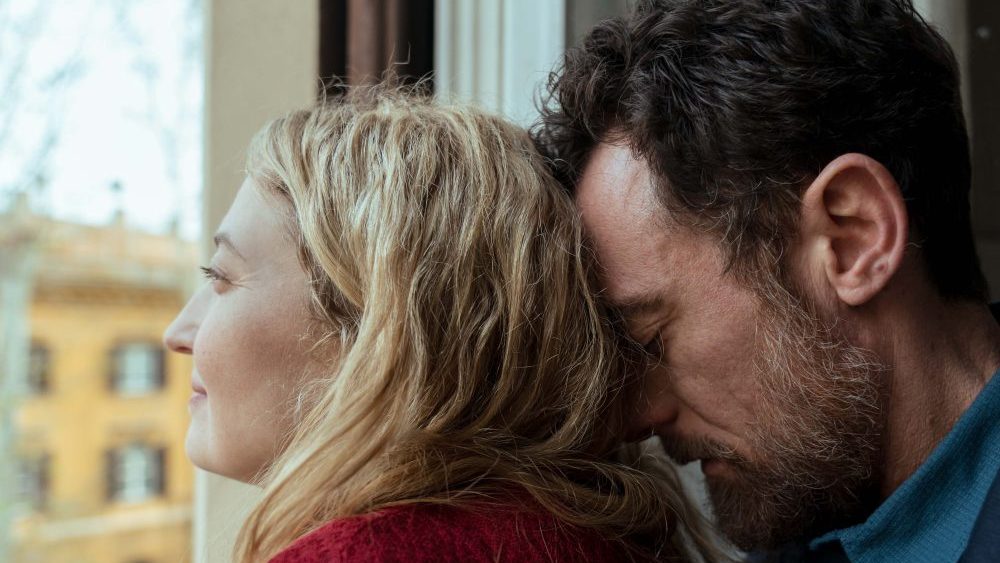“I get along without you very well,” sings Nina Simone in her beautiful, grazed voice at a pivotal moment in Isabel Coixet‘s “Three Goodbyes,” a glimmering drama adapted from a short story collection by celebrated Italian writer and activist Michela Murgia. Lit equally by a radiant Alba Rorhwacher and by a sweet but never saccharine presentiment of future nostalgia (Murgia’s 2023 book was published just months before she died of cancer at 51), the film earns the lovely song fully. It too, is a funny, rueful valentine to the fine art of the farewell — the smaller ones that litter our lives and the big final one at the end.
The first goodbye, however, is pretty banal even if, when it happens, it is fairly catclysmic for the lovers it separates. Returning home from some opening or other one evening, Marta (Rohrwacher) and her partner Antonio (Elio Germano) get into an apparently familiar argument — more of a tiff really — that for some reason this time escalates towards a different end, with Antonio moving out. In the period of mutual mourning that follows, restaurateur Antonio throws himself into his work, while high school gym teacher Marta comes home to a dripping tap in her empty apartment and spreads ketchup on crackers for dinner. Her sister (Silvia D’Amico) and her friends worry about her. Marta worries gently about herself, in particular about her disordered eating and loss of appetite. But mostly she goes about self-healing in amusingly whimsical ways, having bickering one-sided conversations with a slightly soiled full-sized cardboard cut-out of a K-pop star she pulls out of the trash one day, and posting anonymous one-star online reviews of Antonio’s otherwise popular and successful restaurant.
DP Guido Michelotti’s 35mm camerawork is pretty but not overly romantic, except perhaps when it catches the sun flattering Marta’s fabulous halo of artfully messy blonde hair. But its warmth cues a kind of cosiness that is abruptly interrupted when Marta gets an unexpectedly devastating diagnosis from her doctor (Sarita Choudrey).
In other hands, this would cue a standard disease-of-the-week weepie, but Coixet keeps the tone lightly wistful and wise, and trains her attention ever more minutely on Rohrwacher, who along with her character, seems to blossom gradually under this steady gaze. Every personality is an iceberg — 90% of each is underwater — but sometimes a shock to the system can reveal one’s hidden depths to the world, and to the person herself.
So it is with Marta, who in the months following the grim news gets distracted from her various stages of grief by small dramas happening to and around her, through which she gradually begins to re-engage with the world: re-establishing a friendship with Antonio; catching the eye of a charmingly flustered colleague (Francesco Carril); and perceptively, non-judgmentally intervening in the self-harming habits of two of her students. It’s as though the light at sunset suddenly illuminates colors she might not otherwise have seen in the ordinary vistas of the everyday world, which is observed by the sensitive screenplay, adapted by Coixet and Enrico Audenino, in grounded little bits of business that feel directly lifted from normal experience. Connoisseurs of real-things-we-rarely-see-happening-in-movies will enjoy, for example, the way that Marta obtains the three bowls that become a symbol of her appetite for life (the title of Murgia’s book translates to “Three Bowls: Rituals for a Year of Crisis”) not in some deep, meaningful way, but as a points reward on her local supermarket’s loyalty card.
There’s an agreeable chattiness to certain scenes, with characters dropping witty aphorisms into their conversation like “I am not brave enough to turn down an invitation from people I don’t like.” But the film is most moving in its quieter moments, when the longest and most painful goodbye mellows into something like acceptance, tinged with gratitude for the moments that remain to be lived. Rohrwacher’s uncanny ability to make even the most internalized moment of self-revelation unusually interesting to watch has seldom been better used than in the glimpses that we sometimes get here, of a reserve of inner calm so immense it feels like it must spill over from this life into the next.
That might sound maudlin and kind of twee, but it really shouldn’t. To wonder, every now and then, how you will be thought of after you’re gone is useful and instructive for the type of person you want to be while you’re still here. At some point in the future, hopefully not soon but doubtless sooner than you’d like, the whole world will get along without you very well — except sometimes. And that’s when you must hope you’ll have lived a life like the one celebrated with such quiet, absorbing eloquence in “Three Goodbyes”: one that will be remembered with love.

